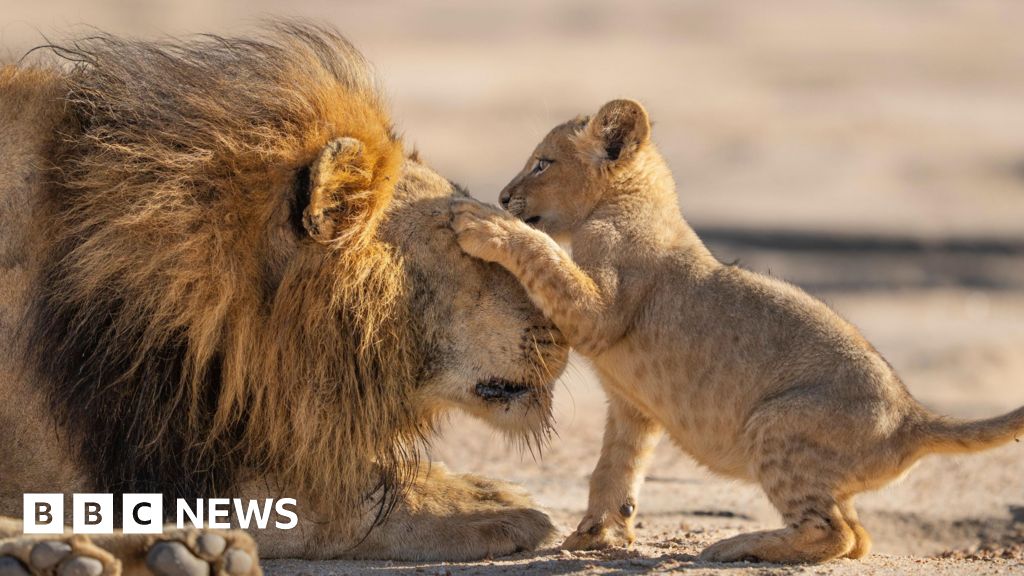Attenborough gives family feels in new show Parenthood
- BBC News
Sir David Attenboroughs latest BBC One series documents how parents from across the animal kingdom sacrifice everything in order to raise their young.
And in the case of the African social spiders, in Namibia, it is quite literally the final sacrifice.
As we discover in Parenthood, the mother spider gives her life for her spiderlings, who, when the time is right, slowly but surely creep up on her and their other elderly relatives en masse and eat them alive... making room for the new generation.
Known as matriphagy, for director Jeff Wilson this moment provided the scene for "the perfect natural history sequence", as well as "the best narration Ive ever heard him [Sir David] do."
"David knows exactly what is needed to tell the story," says Wilson.
"Its a story about the ultimate commitment of a parent. How far do you take your parenting commitment?
"Im not asking any human parents to go that far," he clarifies. "But we all know that if you turn up at the school gates without a snack that youre verging on being eaten by your child anyway!
"So theres a damn good lesson in that."
Capturing such a scene in a "non-intrusive way" requires a huge collaborative effort from a top team of scientists and cinematographers, he adds.
"The spiderlings are about the size of a grain of sugar, and the adults are about the size of your thumbnail. So its a very small world that youre in."
Wilson warns viewers will be left "shivering with disgust" while also "amazed with the wonder of it all".
Parenthood - not to be confused with the 1989 Steven Martin family comedy film - mines the rich well of universal truisms around parenting, he notes, something that lends itself nicely to storytelling.
Wilson realised the unique angle of exploring parenting in the wild had potential, after previously working with Sir David on another BBC and Silverback Films collaboration called The Mating Game.
The filmmaker was "inspired" by observing "how adaptable other parents" in the wild are, and how alive they are to changes in the natural world.
So he went looking - in jungles, grasslands and oceans - across six continents for where more "lessons could be learned" about parental change, dedication and ingenuity.
"The world is changing for everybody really quickly," he stresses, with a nod to the serious threats caused by climate change.
"We wanted to tap into that idea that there is an uncertain future for both animals and humans.
"How do we adapt to a world that is changing around us? Its so relevant to all of us."
He continues: "As a parent myself I constantly worry, what is the world that my children are going to grow up in?"
Aside from the heroically maternal spiders, other potential breakout viral stars of this series include:
As hi-tech close-up images draw us into their worlds, their stories are also driven along in dramatic, heart-rending fashion by a bittersweet musical score courtesy of British composer Tom Howe (who also worked on Mulan and Ted Lasso).
The series also includes a theme song by Sam Ryder, recorded at Abbey Road, which Wilson hopes will become a hit.
All of which brings us back to the shows famous narrator, Sir David, who - at 99 years old - is still providing "special" and "unique" TV moments, his director tell us.
And always in no more than two takes.
"There can be very few people on Earth who have the ability to communicate to an audience from two [years old] to 102, and feel like theyre communicating it at their level," says Wilson, who is also series producer.
"And thats not [just] Sir David as we see him on screen, thats Sir David in real life."
He continues: "When youre working with a partner who understands the natural world as well, if not better than you do, thats always exciting."
Wilson is proud to have been involved in creating what he calls a "generational gift" that parents like him can watch and learn from, alongside their own children.
"I think its got all the feels - its got great behaviour, its got great emotion, its got great humour, its got relatable parental dilemmas.
"And it has a nod and a wink towards helicopter parenting and snowplow parenting - all those different terms that we bandy about as to what type of parent you are."
Hes equally pleased with having delicately explored "perhaps the most sensitive relationship that is present in the natural world" - that between a parent and their young.
To capture that, he explains, relies on "absolutely top class field work", patiently watching and getting shots in "an observational, non-invasive way." In some cases, see-through tanks and "incubation units" were used to create "a specialist filming environment."
"You have that extra challenge in parenting," he says. "Its less hard if youre covering a hunt, as more often than not, the animals couldnt care less whether youre there because theyre in the zone.
"But in parenting behaviours, youre dealing with something thats very sensitive, and if you get it wrong, youre stepping over a line that you shouldnt.
"So were very proud of what weve put on screen in that way."
During one scene, Sir Davids famous voice is heard declaring: "Success for all parents has perhaps the greatest of consequences… It ensures the future of life on our planet."
In other words: respect your elders.
Parenthood, which has five episodes, begins at 19:20 BST on Sunday 3 August on BBC One and iPlayer.